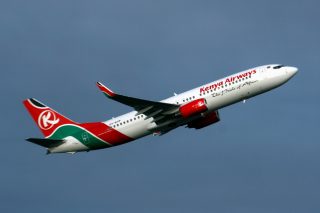In the next few days, workers at Kenya Airways (KQ) will witness a drastic change in the company’s administration. The goal is to create a profitable year by merging departments, changing job roles and laying off employees.
The airline’s acting chief executive, Allan Kilavuka in a memo to staff last week, said the layoffs and restructuring is part of Operation Pride turnaround program, KQs chosen route to profitability.
However, the airways promise to ensure that the restructuring process is done according to the law and will involve relevant stakeholders while taking into consideration the feelings of its workers.
This decision by the airways sparked a reaction from the Kenya Aviation Workers Union (Kawu). On Tuesday, Kawu made claims that the airline is yet to notify the union of its intention to lay off workers, emphasizing that KQ must stop the exercise until the right procedure for layoffs is arrived at.
Kawu Union secretary-general, Moss Ndiema in a letter to the airline said sending workers home will not address the perennial financial malady the carrier is currently facing. Instead, the union blamed the problems faced by the airline on the management, saying mismanagement and corruption at the airline ought to be addressed to achieve better output.
Over the years, the airline has been facing financial difficulties in its operations, owing to the number of losses and debt in the previous years. In December 2019, the airline issued a profit warning, signalling that its losses will widen beyond the $75.6 million (Ksh7.56 billion) reported.
More so, the airline last reported a profit in 2012 when it closed with net earnings of Ksh1.66 billion ($16.6 million). Its worst performance was in 2016 when it recorded a Ksh26.2 billion ($262 million) loss. In 2017, it recorded a Ksh10.2 billion ($102 million) loss.
The airline has been making efforts to improve earnings and find the right financial structure after several years of posting losses. Fuel, personnel and cost of aircraft have been identified among the top three drivers of KQ’s expenses, contributing to about two-thirds of the operating costs.
Early last year, the board announced that KQ, which is 48.9 percent government-owned and 7.8 percent owned by Air France-KLM, plans to double its fleet over the next five years.
Unfortunately, the decision taken by the management in finding a financial solution will lead to significant unemployment. Departments and workers wherein the airline feels its underperforming will be terminated, thereby adding to the already populated labour market.
By Faith Ikade.








